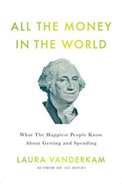This is the premise of Laura Vanderkam’s new book, All the Money in the World, the much-anticipated follow-up to 168 Hours, which I blogged about here: 168 Hours
I am very intrigued by Vanderkam; I am a regular visitor (though not a poster) on her site http://lauravanderkam.com/, and of course an avid reader of both her books. She views the world in a fresh way. Though not an “expert” on either time or money, she has theories about both that defy the norm, and uses real-world research to back up her ideas. In this book, she posits that making more money is more liberating and, when done creatively, can be more fun than trying to “cut back”; that the notion of full retirement may not make us all as happy as finding work that we will love doing into our golden years; how little expenses can make a big difference to our daily happiness; and why giving to others should be a priority for our ultimate happiness.
Vanderkam also provides suggested exercises to do while reading the book, so that we can each think more deeply about how we choose to spend our money. One of these involves looking at your monthly expenses and noting the ones that provide a “high utility function,” the purchases and experiences that you valued most. That can help you prioritize your expenses and discover what makes you happiest, and what matters least. For example, if you find that viewing your receipts from bookstores and coffee shops evoke feelings of contentment, along with a lingering smell of fresh paper and lattes, then that’s not somewhere you should be trying to cut back. Perhaps your cable bill is more expendable, so that you can spend more time in those coffee shops reading those books. Another fun exercise involves figuring out what you’d do if you had a spare $10,000 (assuming that you’ve already taken care of bills, debts and savings).
While these exercises were interesting, I did find myself wondering how they work for couples. For example, I might feel that the cable bill is downsize-able, but my husband, who loves that our package includes many channels of college football, would consider it a high utility function. So if we need to cut back, which of us gives something up? On the opposite end, making more money almost always corresponds to investing more time, meaning less time to spend with family and friends. That’s another couple issue that can’t be resolved simply by making an individual decision about personal money and time priorities. I wish Vanderkam had spent more time and space exploring the relationship and compromise pieces of these issues.
Additionally, I think many would find her argument that we can always make more money, often more happily that we can cut back, a bit optimistic. Some people, if they look creatively at their skill set, can find that creating a sideline or teaching a class in their field is both feasible and fun. But not everyone has the same ability or opportunity to market their talents, especially in this ever-changing economy. For a middle-upper class, well-educated person, I think this could be sound advice. But for people struggling under the weight of debt, a weak job market, and poor education, this seems like unrealistic advice. On the other hand, the people in this second category probably know much more about cutting back and making money stretch than the people in the first, so the book isn’t really marketed toward them.
In All the Money..., as in 168 Hours, Vanderkam gives a fresh perspective, and leaves her readers with much to reconsider about their commonly held, sometimes even unconsidered, beliefs about money and time. We all need someone to challenge our understanding of the way the world works sometimes, and Vanderkam takes on that job admirably. Everyone needs to read these books. Spending the time AND money on them will be well worth it- I promise!

I love Blogger, but I can't even tell you all how irritating I find their font issues... because I copied and pasted from a word document, there was no way to make the font a decent size on this post. It was either giant or tiny. I hope it shows up bigger on your screen than on mine!
ReplyDelete